angularJs---route
Posted 游鱼与渔
tags:
篇首语:本文由小常识网(cha138.com)小编为大家整理,主要介绍了angularJs---route相关的知识,希望对你有一定的参考价值。
route
route---‘路由’
ajax的弊端:
1.ajax请求不会留下history记录
2.用户无法直接通过url进入应用中的指定页面(保存书签,分享朋友?)
3.ajax不利于SEO
前端路由的实现原理是什么?
#哈希 也叫锚点,通过使用锚点实现页面刷新但不跳转。
html5中的history API
route可以说是angular的一大重点。 route可以实现局部页面无刷新跳转(相当于页面里嵌套了页面)
ng官方提供了一套路由 ng-route
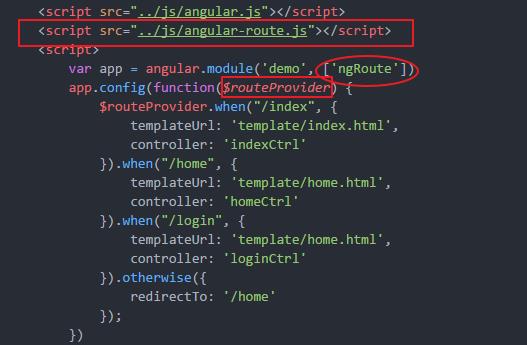
1.引入外部文件:angular-route.js 2.把ngRoute模块注入到主模块 3.使用config函数 注入$routeProvider服务 4.在需要载入页面的地方 加上ng-view
$routeProvider的方法:
when(‘url’, {//code}) 该对象的属性有template/templateUrl--文件地址 controller:‘控制器名称’ url表示拼接在网址后头 #!url
otherwise({//code}) 该方法表示默认的页面 ,接收一个对象,该对象有个属性redirectTo 表示从重定向
需要注意的是:当设置了controller选项时,主控制器就不能用在 标签含有属性ng-view里面了。
<body ng-app="app"> <div ng-controller="myCtrl"> <a href="#!/index">index</a> <a href="#!/home">home</a> <div ng-view> </div> </div> </body> <script src="./js/angular.js"></script> <script src="./js/angular-route.js"></script> <script> var app = angular.module(\'app\', [\'ngRoute\']); app.controller(\'myCtrl\', function($scope){ $scope.name = \'dk\'; }) app.config(function($routeProvider){ $routeProvider.when(\'/index\',{ templateUrl:\'./temp/index.html\', controller: \'indexCtrl\' }).when(\'/home\', { templateUrl: \'./temp/home.html\' }).otherwise(\'/index\', { templateUrl:\'./temp/index.html\', controller: \'indexCtrl\' }) }); app.controller(\'indexCtrl\', function($scope){ $scope.name = \'jjk\' }) </script>
在chrome中显示:

从外部引入angular-route.js 但无法进行深层次嵌套,这时,可以选用第3方插件:angular-ui-route.js
用ng制作的spa(单页面应用)经常有路由嵌套、路由平行的情况
第一种情况:页面嵌套
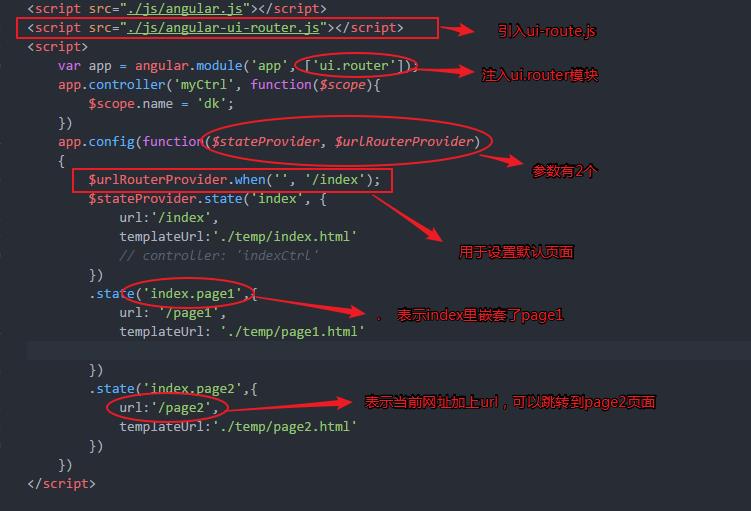
<body ng-app="app"> <div ng-controller="myCtrl"> <a href="#!/index">index</a> <div ui-view style="border:1px solid green"> </div> </div> </body> <script src="./js/angular.js"></script> <script src="./js/angular-ui-router.js"></script> <script> var app = angular.module(\'app\', [\'ui.router\']); app.controller(\'myCtrl\', function($scope){ $scope.name = \'dk\'; }) app.config(function($stateProvider, $urlRouterProvider) { $urlRouterProvider.when(\'\', \'/index\'); $stateProvider.state(\'index\', { url:\'/index\', templateUrl:\'./temp/index.html\' // controller: \'indexCtrl\' }) .state(\'index.page1\',{ url: \'/page1\', templateUrl: \'./temp/page1.html\' }) .state(\'index.page2\',{ url:\'/page2\', templateUrl:\'./temp/page2.html\' }) }) </script>
上面的代码中:
$urlRouterProvider.when(\'\', \'/index\'); 表示默认页面
url 表示在当前网址的基础上加上url
同样可以有controller选项。
在chrome中显示:
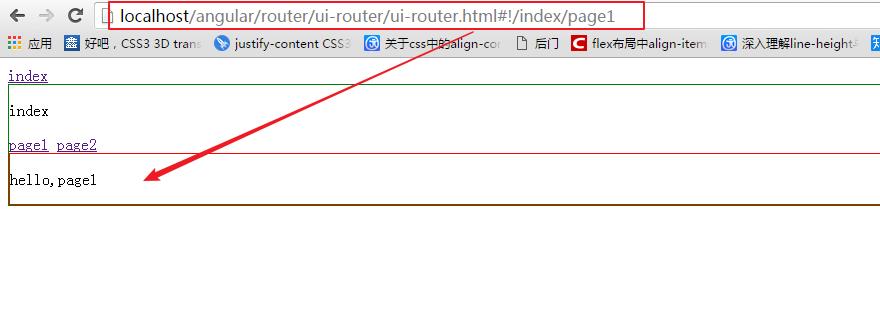
第2种情况:多个ui-view存在同一个页面,互为平行关系。
body部分:
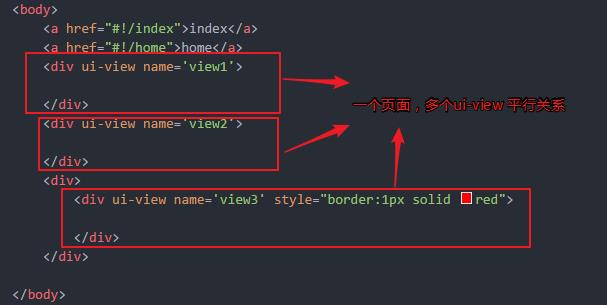
script部分:
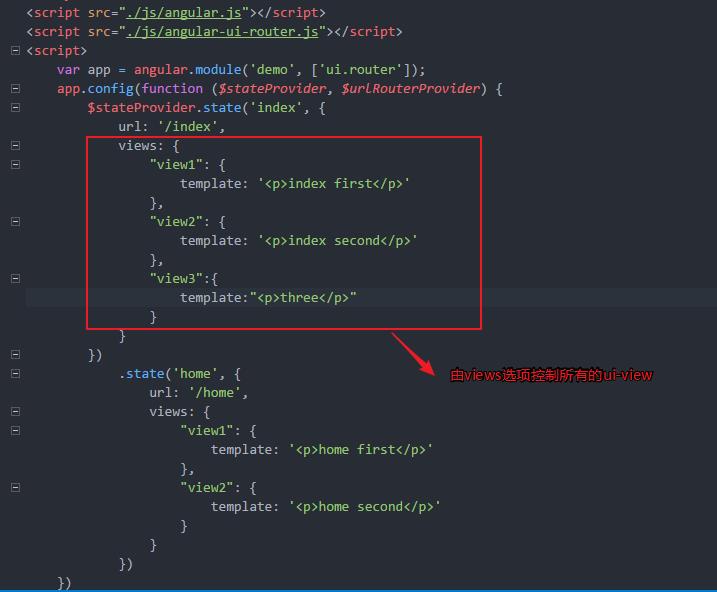
可以看出:给ui-view所在的标签一个name属性,由views选项控制所有的ui-view就可以实现一个页面多个视图。
<body> <a href="#!/index">index</a> <a href="#!/home">home</a> <div ui-view name=\'view1\'> </div> <div ui-view name=\'view2\'> </div> <div> <div ui-view name=\'view3\' style="border:1px solid red"> </div> </div> </body> <script src="./js/angular.js"></script> <script src="./js/angular-ui-router.js"></script> <script> var app = angular.module(\'demo\', [\'ui.router\']); app.config(function ($stateProvider, $urlRouterProvider) { $stateProvider.state(\'index\', { url: \'/index\', views: { "view1": { template: \'<p>index first</p>\' }, "view2": { template: \'<p>index second</p>\' }, "view3":{ template:"<p>three</p>" } } }) .state(\'home\', { url: \'/home\', views: { "view1": { template: \'<p>home first</p>\' }, "view2": { template: \'<p>home second</p>\' } } }) }) </script> </html>
在chrome中显示:

路由传参:在我们平时做的页面跳转都会传参,如:https://i.cnblogs.com/EditPosts.aspx?postid=6556246&update=1, postid=6556246&update=1就是参数。那路由又是如何实现传参的呢?
在url选项中: ‘/index/:id’ id即为参数 如果设置了参数 凡是页面/index/hot、/index/news之类的 hot news均表示参数而不是指第2层ui-view。
一般在a标签里 实现路由跳转 有2种写法:
1. <a href="#/index/hot"></a> hot为参数
2. 使用ui-sref
<a ui-sref="index({id:hot})">show index</a> index表示 路由的名字 ({id:hot})表示参数
监控路由的变化:
监控路由的变化有一般有2种方式
1. 路由状态发生改变时,可以通过监听\' $stateChangeStart \'、\' $stateChangeSuccess \'、\' $stateChangeError \'等事件
监控路由是在run阶段,通过注入$rootScope服务,使用$on监听这些事件。
$stateChangeStart 表示 路由状态开始改变 注意此时url还未改变了,视图还未更新。
$stateChangeSuccess表示 路由状态改变完成,此时url已经改变了,视图仍没有更新。
$stateChangeError 表示 路由状态改变错误。
var app = angular.module(\'app\', [\'ui.router\', \'routers\', \'directives\', \'controllers\', \'ionic\']); // app.controller(\'appCtrl\',function($scope){ // $scope.tab = \'jjk\'; // }) 监听路由变化 app.run([\'$rootScope\', \'$http\', function ($rootScope,$http) { $rootScope.$on(\'$stateChangeSuccess\', function (event, toState, toParams, fromState, fromParams) { console.log(event); console.log(toState); console.log(toParams); console.log(fromState); console.log(fromParams); console.log($rootScope.tab); if (toState.name = \'home.list\') { $http({ url: "https://cnodejs.org/api/v1/topics", method: \'GET\', params: { limit: 10, page: 1, tab: toParams.id } }).then(function (res) { // console.log(res.data); if (res.data.success) { $rootScope.news = res.data.data; console.log($rootScope.news); } }) } } ) }])
注入$rootScope服务,监听$stateChangeSuccess
$rootScope.$on(\'$stateChangeSuccess\', function (event, toState, toParams, fromState, fromParams){//code}
请使用手机"扫一扫"x
以上是关于angularJs---route的主要内容,如果未能解决你的问题,请参考以下文章